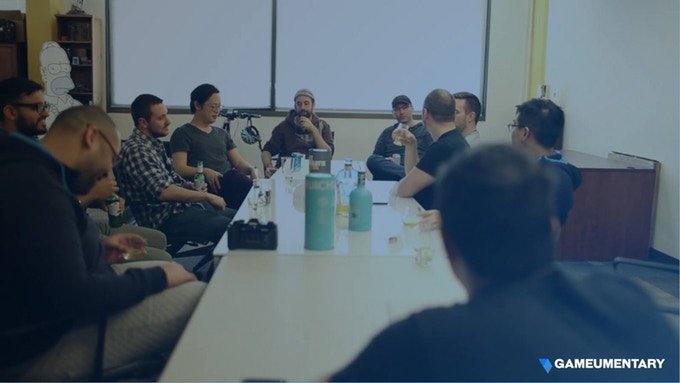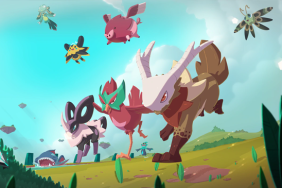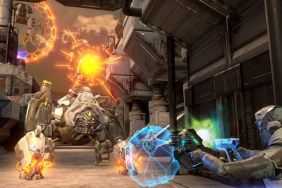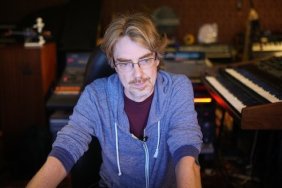We’re currently in an exciting time for games journalism, as we’re seeing more high quality features (both in video and written forms) detailing how everyone’s favorite games were brought to life. Looking to join those ranks is Nick Calandra, the founder of Gameumentary. He’s looking to produce video documentaries detailing the people behind video games, and to do so he’s launched a Kickstarter. Since I’m a fan of his work, and good journalism in general, I recently chatted with Nick about his upcoming project that would see the team produce documentaries on Darksiders, Perception, Kingdom Come: Deliverance, and more.
PlayStation LifeStyle: What led to you wanting to create documentaries, have you always had a passion for that field?
Nick Calandra: I’ve been doing games journalism writing since I was 14 years old, and I’ve ran a few sites – OnlySP was my previous one. Kind of near the middle of 2016, I had become very tired of just writing news all the time, and I really wanted to focus on feature content. It just never really got traction like we had hoped, and I started backing away from games journalism. Then Danny O’Dwyer launches the Noclip platform. Documentaries and longform content is something we had wanted to do, but we didn’t really know if there was an audience for it. We saw the popularity of [Noclip], and decided that we could do something different with it. So, we took the approach we had taken at OnlySP, and started contacting indies. “Hey, we have an idea to share your story in a unique and compelling way.” It took a while to get some bites, but then Runic Games signed on to do the first doc.
PSLS: How difficult has it been finding developers to agree to do a documentary?
NC: It took a while to get our first bite, Runic was kind enough to give us a chance to show what we could do, but after that developers haven’t really turned us down unless they just don’t have time to do it. For the Kickstarter we picked and chose what we could feasibly do, and we’ve got more studios lined up through 2018 already. Can’t say anything about that yet, but there isn’t any downside for these studios to do a documentary. It’s basically free publicity for them. Right now we’re in Boston doing The Deep End Games documentary, and it’s a really unique way to see how things work [in game development]. I think a lot of people miss the fact that each studio has a very unique story to them regardless of who they are. When you meet everyone involved you really get a sense of that story.
To get back to your original question, all the studios have been very receptive. It’s a different type of coverage, and our documentaries are going more in-depth and into the personal side of things. That’s one of the things we didn’t do too well within the Runic doc, and we didn’t go into everybody’s backstories as much as we wanted to. That’s what we’re trying to rectify with this new doc, as we’re going really deep in Bill and Amanda’s personal history in games. They’re a husband and wife that developed a game in their basement.
PSLS: These documentaries really humanize the creators. There’s a lot of toxicity online, do you feel like these types of documentaries can really show the human side to these games?
NC: Certainly. When you write online people like to assume a tone, and sometimes people might take something aggressive when it’s not. So, putting these people on camera and giving them their time to explain their passion and how they develop their games, it definitely adds a personal touch to it. You get a more personal connection with them than you would messaging them on Twitter.
PSLS: You’re billing these documentaries as “short docs,” and your Runic documentary was 30 minutes long. Is that the length they’ll be going forward?
NC: You know what? I don’t think so. Yesterday we got a lot more content than I expected to get and we haven’t even touched on Perception yet. We spent about seven hours just filming their backstory. We also did a side-project on Bioshock’s opening level, and we only expected that to be a 20-minute conversation, but it turned into an hour. So, it’s basically a full-sized doc on its own.
PSLS: So, we’re gonna see more in-depth content in the future?
NC: Oh, yeah. We have Darksiders and Kingdom Come: Deliverance in our future. We fully expect some of these to go an hour, hour and a half in some cases. One thing that won’t happen is splitting these up into different parts like Noclip has been doing. We want to keep these as one video, and then release supplemental content on top of that.
PSLS: Do you credit Danny O’Dwyer and Noclip for showing that there is a larger market than you had previously thought for these hard-hitting, in-depth video documentaries for games?
NC: Yeah. He definitely deserves credit. Danny released a video that really spoke to me about games journalism, and he talked about how he wants to see more of this type of content himself. So, I don’t feel like we’re competing with him, but adding to the narrative and helping add something different from the generic news site. There are some other YouTube channels that are also doing really well, like GVMERS, and they have developers write the script for some of their videos like this really cool one they did on FEAR. It’s really cool. Also, there’s My Life in Gaming, who did a really good doc on Night Trap. So, he really inspired me to continue on when I was close to having my day with games journalism.
PSLS: Would you say that this project reignited your passion for covering games?
NC: Yeah. Going out to do the Runic doc was easily one of the most fun experiences I had. There’s a difference between skyping a person to interview them and going to their studio and seeing everything that works. It’s a more personal experience and that connection you make with the developers is completely worth it for me.
PSLS: What kind of improvements will we see going forward from the Runic doc?
NC: The Runic doc didn’t really focus on the personal side of thing, more of just a studio history. So, we’re diving deep into personal backgrounds so we can get their story as a gamer. On top of that, we have to differentiate ourselves from Noclip. A lot of Danny’s documentaries have been purely focused on them as a studio. I can’t really speak too much as to what we’re doing, but to give you an idea we’re going to Salem today for Perception. So, maybe that’ll give you an idea as to how we’ll be showing more than just the studio.
PSLS: Game dev takes place all across the globe, so how important is it to show the location of the studios, as I feel like that bleeds into game development?
NC: Wherever a studio is located, the location ends up inspiring a lot of the game. You’ll see that in our Perception doc that is coming up, and tomorrow we’re going to a Unreal Engine development meet up in Boston. So, we’re gonna try to get some other developers perspectives on what is unique about Boston in terms of game development, and what amenities this place offers that Seattle doesn’t.
https://www.youtube.com/watch?v=iBs7rSsj52A
PSLS: Why go for Kickstarter? Do you feel that Patreon is best for people with an established audience, while you can still be a surprise on Kickstarter?
NC: Exactly. I’m about to graduate college, I have four months to go, and a lot of our team are recent college grads trying to find their footing. This is our dream job. When we launched our Runic doc, our YouTube channel had 33 followers on it. Patreon you need a following to gain any traction, so Kickstarter is our way of saying “Hey, these developers are confident that we can create a documentary up to their standards, we just need to fund the gear and production. Then the content will speak for itself.” Our plan is to eventually switch to Patreon, but this is our initial funding.
PSLS: You have a modest 22,000 goal, and you’re about 1/4th of the way there so far. How happy are you with the amount you’ve raised so far?
NC: We’re surprised with the amount we’ve raised. Obviously, the developers are promoting a little bit, although they’re not funding it at all. We don’t want it to look like a paid advertisement. So, all the funding we’ve got is through social media, and we’re trying to get some media coverage now. So far word of mouth has funded us so far.
PSLS: In terms of dream documentaries, what studio or game would you like to do a deep divbie on in the future?
NC: Honestly, the Darksiders documentary is something I never expected to get lined up. When they agreed to do it, it blew my mind. Darksiders 2 was one of the first games I reviewed, I had no idea about it, and it ended up being one of my favorite games. So, I’m super excited to get the chance to do that. Another studio I’d love to check out is 4A Games, who did the Metro series. That was another one of those games that I had no basis for prior to playing it, and it ended up being one of my favorite titles.
The @TheDeepEndGames doc isn't just about the game. It's about family, history and what it takes to be a #gamedev. https://t.co/ynL5Uya31p pic.twitter.com/Spp4c6s4A4
— Gameumentary (@gameumentary) August 15, 2017
PSLS: Can you talk about the upcoming schedule, and what people can expect to see out of Gameumentary?
NC: We’re filming the Perception doc now. We’re sort of following a close schedule to what Noclip does, where we film one month and release it the next month. We did just film the Bioshock thing, and we’ll have an announcement about that soon. The 10-year anniversary is coming up, so that might be something to watch out for. Of course, if we’re funded we’ll be out in San Francisco next month doing the Outpost Games doc, and then in October we’ll be doing Kingdom Come: Deliverance in Prague, and then going out in Austin, Texas in November to do the Battlechasers, and Darksiders documentary. The Darksiders documentary would be released in early 2018, and it should be a feature length doc. As long as we’re funded we’ll have something out each month.
PSLS: Tell our readers why this type of journalism is important, and why they should back it on Kickstarter?
NC: It’s important because it humanizes developers, and we only get so much of the story through written content. I wasn’t a huge believer in video content as I wasn’t a fan of “let’s plays,” but once I saw what Danny O’Dwyer was doing, that inspired me. This is a better way to share dev’s stories. One of the most telling scenes in our Runic doc is when you look at Patrick Blank and you see the bags under his eyes. You see the stress he’s going through, and you can’t get that through a written article. He can say he’s tired, but when you look at him you see how stressed out he really is. That speaks to me more.
Every day you see people complain about games journalism, but there are people like us that are trying to improve it. So, that’s something I’d support right on the spot.
A major thank you to Nick Calandra for taking the time to speak to us. He can be found on Twitter @NickJCal, and @gameumentary. If you’re interested in their documentaries, consider donating on Kickstarter.










